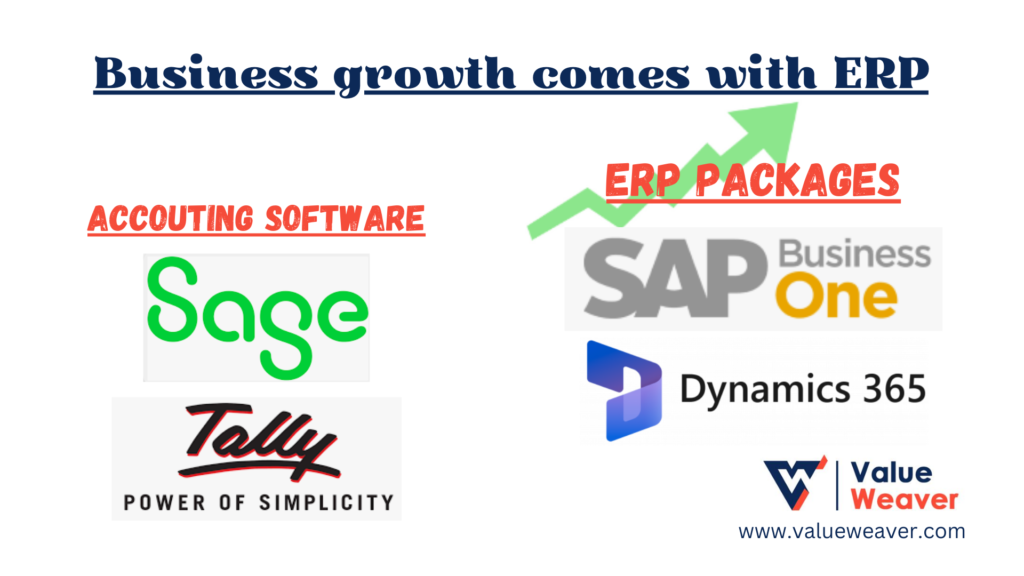Contact Info
- 2A Penrose Avenue, Woodley, Reading RG5 3PA
- +44-7528160272
- contact@valueweaver.com
- Office Hrs: Today 9.00am to 6.00pm
Accounting software and ERP (Enterprise Resource Planning) packages are essential tools for modern business management. Accounting software is designed to handle core financial functions such as bookkeeping, invoicing, and financial reporting, offering businesses an efficient way to manage their finances.
On the other side, the businesses which are looking for growth and expansion would need ERP packages to go beyond just accounting. ERP packages integrate various business processes into a unified system. ERP helps business owners to bring an order to have a purpose, transparency and accountability in the business.

Small businesses are totally dependent on owners’ time for chasing tasks & activities, decision marking for crucial transactions and while focusing on profit margins. With ERP, business owners can be dispensable for their business and can have better work life balance. In addition, when it comes to transition of the business to next generation or selling it off, ERP package helps in providing overall health of the business and helps next owner to have better control.
Best ERP packages include modules for inventory management, human resources, supply chain, inventory management, customer relationship management (CRM), procurement, sales and more. By combining financial and operational data, ERP systems provide real-time insights and improve decision-making, enabling businesses to streamline processes, enhance productivity, and achieve better control over resources.
Following is detailed comparison of accounting system like Telly and best ERP systems (SAP B1 and Microsoft D365 BC).
1. Scope
•Accounting Software: Primarily focused on financial transactions, including general ledger, accounts payable, accounts receivable, payroll, and financial reporting. It is designed to manage an organization’s financial operations.
•ERP Software: Broader in scope, managing multiple business processes across departments (such as finance, manufacturing, supply chain, human resources, procurement, and inventory). Accounting is just one component of an ERP system.
2. Functionality
•Accounting Software: Limited to financial data management, focusing on recording, summarizing, and reporting financial transactions.
•ERP Software: Integrates various functions of a business into a unified system. It supports workflows in areas like production, sales, purchasing, inventory management, human resources, and customer relationship management (CRM).
3. Modules
•Accounting Software: Usually comes with basic modules like general ledger, expense tracking, invoicing, and tax management.
•ERP Software: Includes a wide range of modules beyond accounting, such as manufacturing, inventory, supply chain management, project management, and customer relationship management.
4. Complexity
•Accounting Software: Easier to implement and use due to its narrower focus. It typically requires less customization and training.
•ERP Software: More complex and customizable because it integrates different functions. Implementation often takes longer and may require more training to use effectively.
5. Integration
•Accounting Software: Can integrate with other business software (such as CRM or inventory management tools) but may require third-party tools for this purpose.
•ERP Software: Offers seamless integration across departments and functions within the organization. Data flows freely between different modules, improving collaboration and visibility.
6. Target Users
•Accounting Software: Typically used by small to medium-sized businesses or accounting departments that only need to manage finances.
•ERP Software: Suitable for larger organizations or businesses that need to integrate various departments and workflows into a single system.
7. Reporting and Analytics
•Accounting Software: Provides basic financial reports such as profit and loss statements, balance sheets, and cash flow statements.
•ERP Software: Provides advanced analytics and reporting that spans across various departments, giving a holistic view of the business.
8. Customization and Scalability
•Accounting Software: Limited customization and scalability. Suitable for businesses that only need to manage their accounting and finances.
•ERP Software: Highly customizable and scalable, making it suitable for businesses looking for a system that can grow with them and support more complex operations.
9. Cost
•Accounting Software: Generally more affordable, with lower upfront costs and subscription fees.
•ERP Software: More expensive due to its complexity and broader scope. It often requires a larger investment in terms of software, hardware, and personnel.
10. Decision making
•Accounting Software: Can not help in decision making when it comes to business growth, customer care, sales, purchase and manufacturing.
•ERP Software: Data oriented decision making in all departments to support business growth for generations.
Value Weaver has been advising clients to grow their businesses and has been assisting in implementing best technology and ERP packages to help business owners to grow their businesses.
We provide following services for SAP Business One and MSD 365.
SAP Business One Implementation Services, SAP Business One Migration Services, SAP Business One Rollout Services, SAP Business One Setup Services, Professional SAP Business One Setup
Contact us to learn more. email: contact@valueweaver.com
SAP Business One Implementation, Rollout & Support Services – Value Weaver
| Cookie | Duration | Description |
|---|---|---|
| cookielawinfo-checkbox-analytics | 11 months | This cookie is set by GDPR Cookie Consent plugin. The cookie is used to store the user consent for the cookies in the category "Analytics". |
| cookielawinfo-checkbox-functional | 11 months | The cookie is set by GDPR cookie consent to record the user consent for the cookies in the category "Functional". |
| cookielawinfo-checkbox-necessary | 11 months | This cookie is set by GDPR Cookie Consent plugin. The cookies is used to store the user consent for the cookies in the category "Necessary". |
| cookielawinfo-checkbox-others | 11 months | This cookie is set by GDPR Cookie Consent plugin. The cookie is used to store the user consent for the cookies in the category "Other. |
| cookielawinfo-checkbox-performance | 11 months | This cookie is set by GDPR Cookie Consent plugin. The cookie is used to store the user consent for the cookies in the category "Performance". |
| viewed_cookie_policy | 11 months | The cookie is set by the GDPR Cookie Consent plugin and is used to store whether or not user has consented to the use of cookies. It does not store any personal data. |

Leave A Comment